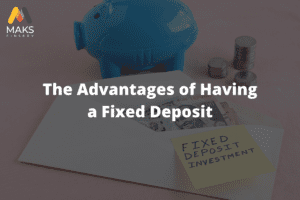- Home
- Fixed Deposit
Instant paperless account opening
Secured and future proof investment plan
Start with a deposit of as low as 25,000 rupees
ASK an Expert
Features and benefits
A fixed deposit is a low-risk financial instrument offered by banks, post offices, or NBFCs. At MAKS Finserv, we offer you the best rates to help you earn better returns.
Amid the rising market volatilities, MAKS Finserv FD offers you assured returns and steady saving growth. This allows you to build your savings without any effect of market fluctuations.
Secured Returns
Get high secured high returns on your investment for post-retirement expenses.
Flexible Tenors
The longer you invest the more you earn. Enjoy flexible tenors up to 60 months.
Low Deposits
Start investing with an amount as small as 25,000 rupees.
Paperless
In a hurry to invest? We have got you covered with our quick paperless process.
Eligibility and Documents Required
Individuals:
- Resident Indians
- Persons of Indian origin
- Non-resident Indians
- Overseas citizens of India
For Individuals
- Latest Photograph
- KYC of all Applicants (1. PAN Card 2. Aadhaar Card, Passport, Driving License, voter ID)
For a Public/private limited company
- Certificate of registration
- PAN
- Partnership deed
- KYC of authorised signatories
For a Hindu Undivided Family (HUF)
- PAN
- HUF deed and declaration
- KYC of Karta
For Statutory body/Local Authority
- Copy of the permission granted by the government authority/ respective ministry to invest
- Certificate of incorporation/ registration
- PAN card
- Latest telephone bill or electricity bill or bank account statement
- KYC of authorised signatories
For Societies
- Certificate of incorporation/ registration
- Memorandum and articles of association
- Board resolution for opening the account
- PAN
- Latest telephone bill or electricity bill or bank account statement
- KYC of authorised signatories
Age
Individuals need to be above 18 yrs of age
Non-individuals
- Sole proprietorships
- Partnership firms
- Companies
- Hindu unified families
- Clubs
- Associations
- Societies
- Family trusts
Types of personal loan interest rates
Personal loans come with two types of rates of interest: Fixed interest rate and floating interest rate.
1. Fixed interest rate
As the name suggests, the interest rate remains the same throughout the loan tenor. Thus. the loan E Ils will also remain constant.
2. Floating interest rate
A floating, adjustable, or variable interest rate is linked to an internal benchmark of a financial institution. Changes to this benchmark will affect the rates. Hence, floating rates vary throughout the loan tenor.
Both of these rates have advantages and disadvantages. Fixed rates keep ENls constant, which helps in budgeting. On the other hand, floating rates go up or come down along with the internal benchmark rate.
Methods for Interest Calculation on Personal Loan
1. Flat rate method
In this method, the applicable rate of interest is charged on the entire principal throughout the tenor.
2. Reducing balance method
In the diminishing balance or reducing balance method, the applicable rate of interest is chargeable on the outstanding principal after each EMI is paid off. Thus, the interest is calculated every month on the loan balance. Borrowers pay lower interest on the loan compared to the flat rate method.
Interest rate calculation formula
The interest rate for a personal loan through the flat rate method and the reducing balance method is calculated using the following formula:
1. Flat rate method
The rate of interest is chargeable on the entire loan principal. The formula for this method is — ENI = (principal + total interest payable) / loan tenor in months Wherein, total interest payable = P x r x n/100
Contact MAKS Finserv Customer Care
If you are a new customer who is looking for information about the
MAKS Finserv Fixed Deposit
- Visit our branch by finding us on Google
- SMS HELP to +91 9717708810
Frequently Asked Questions
MAKS Finserv offers cumulative and non-cumulative interest payment options.
In a non-cumulative fixed deposit scheme, the interest is payable monthly, quarterly, semi-annually, or yearly. This scheme will be convenient if you require periodic interest payments.
In a cumulative fixed deposit scheme, the interest is payable at maturity along with the principal and is compounded annually. This scheme is suitable for individuals who do not require periodic interest payouts. The final payout at maturity will be subject to deduction of tax, wherever applicable.
No, there are no benefits on FD renewal.



